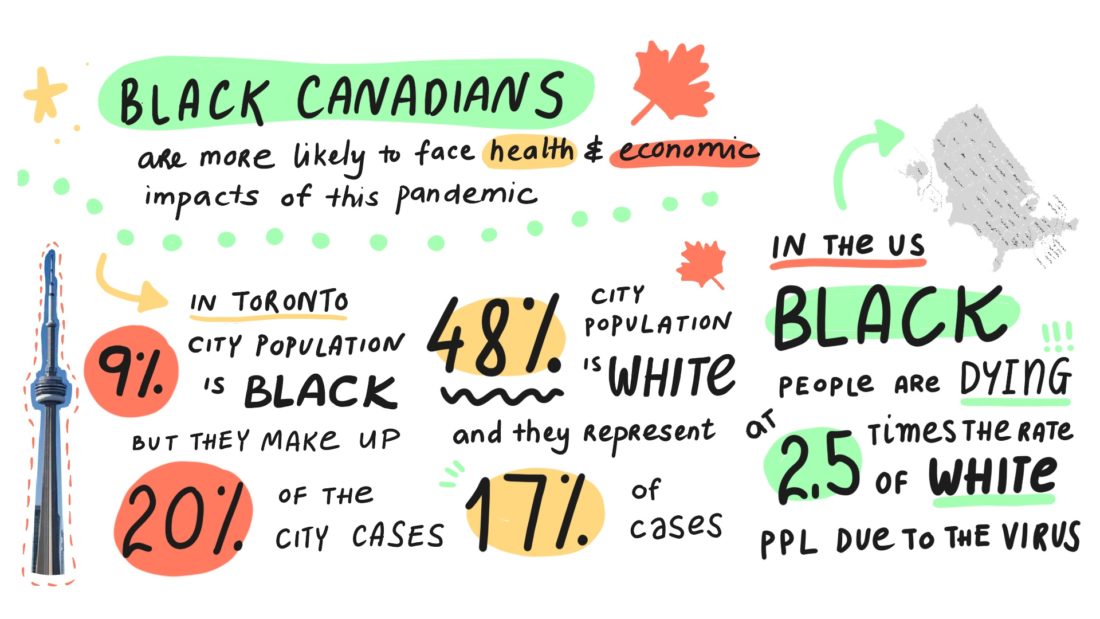
From the data available on COVID-19’s impact, the facts are startling.
Although we have all lived through a pandemic in this past year, we have not all had the same experiences. It is high time we gather disaggregated data to understand the full extent of COVID-19’s impact on marginalized communities.
That kind of data is incredibly important to understanding the extent of the virus’ impact, deciding how resources should be distributed and planning how governments can support marginalized populations.
According to a study done by Edmonton-based African Canadian Civic Engagement Council and Innovative Research Group, Black Canadians are more likely than other Canadians to face the health and economic impacts of this pandemic, including seeking treatment and experiencing job loss.
In Toronto, while Black people make up only nine percent of the city’s population, they represent 21 per cent of the city’s cases. On the flip side, illustrating this disparity, white people, while making up 48 per cent of the city’s population, represent 17 per cent of cases.
This is not a problem specific to Canada. In the United States, it has been found that Black people are dying at 2.5 times the rate of white people due to the virus.
However, most health data collection is accumulation-based and does not explicitly offer detailed insight into the impact of COVID-19 on vulnerable populations. That is why it is necessary to gather disaggregated data to understand how the COVID-19 pandemic impacts specific communities.
Last June, 11 of Canada’s human rights commissions, on the federal, provincial and territorial level, called on the federal government to implement a national strategy for the collection of disaggregated health data.
And there is a good reason to do so. It is well-acknowledged that social, economic and political factors are “vitally important for health and wellbeing,” according to the Canadian government. Pandemics tend to exacerbate existing health disparities and inequalities.
Although we tend to think of racism in its most obvious forms only, like when protestors mocked Saskatchewan Chief Medical Officer Dr. Saqib Shahab’s name, systemic discrimination also means that racialized and Indigenous Canadians experience more sickness and face greater barriers when seeking health care, as reported by Lumino Health.
Diabetes Canada reports that Indigenous populations in Canada are three to five times more likely to experience diabetes. A study done by McMaster University concludes that South Asian Canadians have higher rates of heart disease. According to a study done at McGill University, Black Canadian women have “substantially higher rates of premature births than white women.”
As recognized by the Canadian Institute for Health Information this problem, “makes it difficult to measure health inequalities that may stem from racism and discrimination.”
The need to gather disaggregated COVID-19 data is right in front of us. We know that health is shaped by work, race, income, gender, immigration status and a whole plethora of factors. We know that Canadians from marginalized backgrounds face greater health challenges. Yet, we are almost a year into the pandemic, and a national strategy for this data collection hasn’t materialized.
We must do better.
Oftentimes, Canadians use their words to support marginalized communities. Most recently, last summer many Canadians participated in Black Lives Matter protests. But our responsibility to our fellow citizens must go beyond words, and reach action.
Last March, Prime Minister Justin Trudeau said, “While the COVID-19 pandemic affects all Canadians, some people and communities are more at risk to its impacts.”
He was right. Now it is up to him, the federal and provincial governments, to follow on the promise of securing the health of all Canadians, by developing a national strategy to collect data based on health determinants.
For Canada’s pandemic response to serve all of us, we need to have the numbers to understand how the problem affects us all.
This op-ed was written by a University of Saskatchewan undergraduate student and reflects the views and opinions of the writer. If you would like to write a reply, please email opinions@thesheaf.com. Vaidehee Lanke is a third-year undergraduate student studying bioinformatics and is the Opinions Editor at The Sheaf Publishing Society.
—
Vaidehee Lanke | Opinions Editor
Graphic: Anh Phan | Design Editor
Leave a Reply